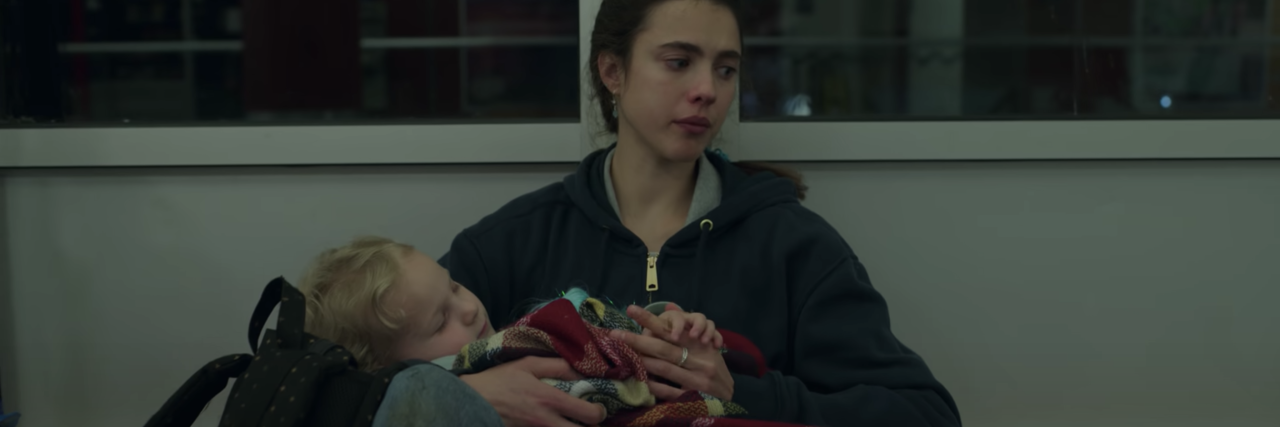If You Find Netflix's ‘Maid’ Triggering, This Could Be Why
Editor's Note
If you’ve experienced domestic violence or emotional abuse, the following post could be potentially triggering. You can contact The National Domestic Violence Hotline online by selecting “chat now” or calling 1-800-799-7233. You can contact the Crisis Text Line by texting “START” to 741741.
Netflix’s “Maid” was released at the beginning of October and is on the way to becoming the streaming network’s biggest limited series. The story opens when Alex escapes from her alcoholic husband in the middle of the night, along with their 3-year-old daughter, Maddy. As the series unfolds, Alex fights for her daughter’s safety and security while she navigates the ins and outs of low wages, underemployment, homelessness, social services, housing assistance, food insecurity, custody battles, and toxic family relationships.
“Maid” depicts an honest and realistic picture of what it’s like to leave an abusive relationship in America. As a storyteller and a trauma coach, I want “Maid” to be necessary viewing for anyone who has survived domestic violence and/or emotional abuse.
Those who have experienced emotional abuse should expect the show to be triggering. Prepare to watch it according to what feels right and safe for your needs, whether that’s in small amounts, or when there’s time for processing and self-care afterward. For those who recognize the patterns and are well down the road of trauma recovery, it may feel validating to see one’s own experience depicted in Alex’s.
But what makes “Maid” truly powerful is this: Many who watch this show will resonate deeply with Alex but may not consider their own experience as “valid” abuse. They may be triggered but may not understand exactly why. I remember watching “The Color Purple” many years before I came to terms with my own experience of emotional and sexual abuse, not understanding entirely why the film made me weep more than anyone else in the room. My own discovery that my childhood traumas did in fact qualify as abuse felt like an epiphany, even though I had been dealing with the impact for decades. That epiphany led me toward understanding trauma on a much deeper level than before, and helped me resolve many toxic patterns for good.
Many who watch “Maid” may at first feel like Alex, who explains to her social worker that she doesn’t qualify for domestic violence services because her husband doesn’t hit her, and that resource should go to the women who are “really” abused. Denial and minimization are common forms of coping that both abusers and victims may use to avoid the pain of reality. It’s through Alex’s discovery that her ex-husband’s terrifying rages and the ways he blocks every possible route to leave him by controlling all the finances does in fact count as abuse. That realization starts her on a journey of inner recovery and resolve to break the cycle of abuse that also existed in her own childhood, so that her daughter has every opportunity to live to her full potential.
I see “Maid” as a love letter to those who choose the difficult but necessary path of escaping their abusers at all costs. Most importantly, it does not make light of how nearly impossible it is to break free and start over with nothing but your own resolve for a better life. It also empathizes with those who remain trapped. My hope is that the world will see Alex’s character as the hero she is, and resolve collectively to do better in helping survivors of emotional abuse get the support they need.
For many, “Maid” could be the story that wakes people up to their own traumas surrounding domestic violence, poverty, and emotional abuse.
If you feel triggered by the depictions of emotional abuse and neglect, domestic violence, and poverty in “Maid,” chances are you’ve experienced something traumatic in your life and could use some extra support through counseling, therapy, coaching, or other therapies. If this resonates, but you find yourself making excuses, minimizing the pain, or doubting your own experience, please let “Maid” be your wake-up call that your experience is valid. Many of us have been right where you are, and we are here to tell you that the struggle for healing and growth is worth it. You matter. Your story matters.
Image via YouTube

